Venus
as morning star in spring should reasonably
be associated with green (as the colour of old copper) and
I have tried to paint the numbers with
'planetary colours' - beginning with Mercury
corresponding to number 1. Odin (as in
Swedish Onsdag, the day of Odin - Wednesday)
initially had a pair of eyes, but he
sacrificed one of them (and in Russian
odin means one).
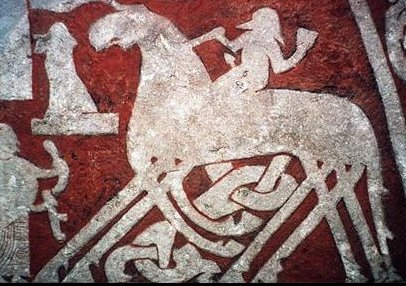
... the Chaldean
astrologers introduced the 7-day week which has come down into
the present. The number was convenient because the seers
recognized seven planets: Saturn, Jupiter, Mars, Sun, Venus,
Mercury and the Moon, each of which governed one hour of the
day.
If, for
illustration, Saturn ruled the first hour of a certain day
followed by each of the 'planets' in turn, he also ruled the
eighth, fifteenth, and twenty-second hours. Jupiter was lord of
the second, ninth, sixteenth, and twenty-third hours; Mars
presided over the third, tenth, seventeenth, and twenty-fourth
hours, and the Sun took charge of the first hour of the
succeeding day.
Since the planet which ruled the first hour gave his name to the
entire day, Sunday thus followed Saturn-day, and this was the
way the names of the days of the week came into existence out of
ancient Chaldean astrology
... (Makemson)
In my
order for the planets Mercury (Quickly
Running Silver)
is at the beginning. French Mercredi
means Wednesday - the day for
turning down (hakaturu).
|
Turu
To come down, to go down, to descend;
ka-turu-age koe ki tai, go down to the sea now;
turuga, coming down, descent. Vanaga.
1. To fall in drops, to flow, to leak,
to descend, a drop; turu ki tai, to take refuge
at sea; hakaturu, to cause to descend, to lower,
to take soundings; hakaturuturu, to heave and
pitch. Turuga, declivity. Turuvai, water
conduit. P Mgv.: akaturu, to conduct water in a
drain. Ta.: tuturu, to fall in drops. 2. To stay,
to prop. T Pau.: turu, a post, pillar, to
sustain. Mgv.: turu, a support, rod, stay, to
sustain. Ta.: turu, stay, support; turuturu,
posts of a house. Ha.: kukulu, a pillar, a post.
3. To come, to arrive, to overcome; tehe e turu,
through and through; hakarava hakaturu,
quadrangular. Churchill. |
It was
only the Mad Hatter who benefitted from
moving one pace ahead at the table.
...
Mercury was used in the process of curing
pelts used in some hats, making it
impossible for hatters to avoid inhaling the
mercury fumes given off during the hat
making process; hatters and mill workers
thus often suffered mercury poisoning,
causing neurological damage, including
confused speech and distorted vision ...
(Wikipedia)
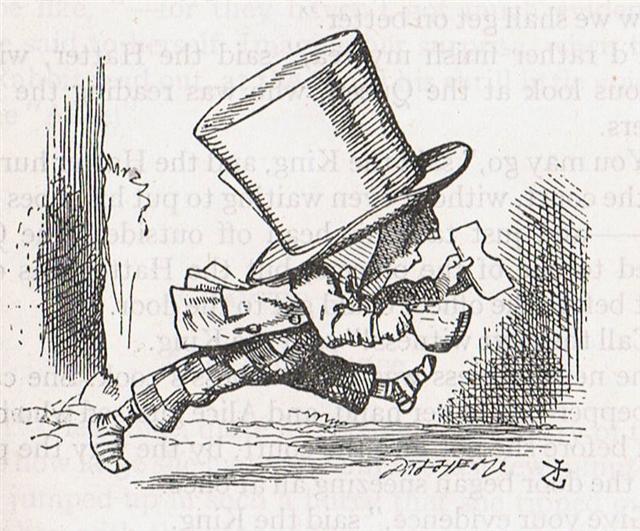
The
first emperor of China (Shih Huang Ti) had an
enormous subterranean palace built for him as
a proper place for his burial. It has been
described in detail, and the ceiling (cfr
French ciel, sky) was like
the night sky with all its stars, whereas
the floor was submerged under liquid
mercury (reflecting the stars above). The beginning
was at the bottom and at
the top was the end. And recent
archeological excavations at Teotihuacan,
under the pyramid of Quetzal Coatl (the Serpent
with feathers from the Quetzal bird), have revealed a similar
subterranean lake filled with mercury.
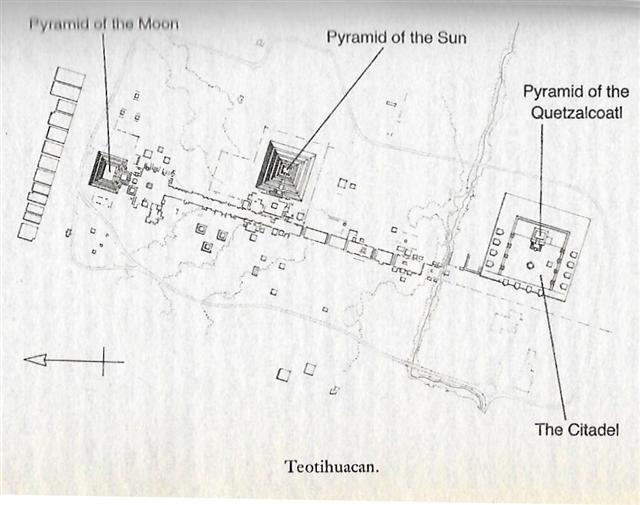
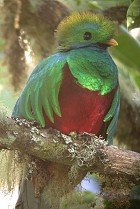
Moving
ahead in the week Thursday (the day of
Jupiter, the Oak Door) will be next. However, we know
Mercury was later in the Babylonian
cosmogram than Jupiter.
Mercury was between 'straw' (Furrow) and
'leaf' (Frond) in Virgo and Jupiter was at
the head of the Lion (and at the feathered wings
of the Serpent). But if the beginning was in
Virgo, then Jupiter should be at the end, leaving a dark time until the next beginning.
For instance,
472 (= 8 * 59) - 399 (circuit of Jupiter) = 73
(= 365 / 5).

 
I guessed Father Light
(Jupiter) was followed by his (?) little son Mercury
which in turn would grow up to become the next
ruler.
Regulus, The Little King,
α Leonis, at
the heart of the Lion, came after the
head of the Lion. Therefore blue (as the sky) could
be a common colour for them. The colour of
Tin, for Jupiter, was equally impractical as
the colour of the silvery Mercury, and for
the Moon white (cfr The White Goddess
by Robert Graves) was quite impossible against
a white background.
|
Mercury |
Jupiter |
Venus |
Saturn |
Sun |
Moon |
Mars |
|
1 |
2 |
3 |
4 |
5 |
6 |
7 |
|
8 |
9 |
10 |
11 |
12 |
13 |
14 |
|
15 |
16 |
17 |
18 |
19 |
20 |
21 |
|
22 |
23 |
24 |
25 |
26 |
27 |
28 |
... The little spring was
concealed by a succulent
growth of strange plants,
bearing gigantic leaves and
pendant clusters of long
yellow fruit, which she
named bananas. The
intervening space was filled
with a luxuriant growth of
slender stems and twining
vines, of which she called
the former sugar-cane and
the latter yams; while all
around the house were
growing little shrubs and
esculent roots, to each one
of which she gave an
appropriate name. Then
summoning her little boy,
she bade him gather the
breadfruit and bananas, and,
reserving the largest and
best for the gods, roasted
the remainder in the hot
coals, telling him that in
the future this should be
his food. With the first
mouthful, health returned to
the body of the child, and
from that time he grew in
strength and stature until
he attained to the fulness
of perfect manhood. He
became a mighty warrior in
those days, and was known
throughout all the island,
so that when he died, his
name, Mokuola, was
given to the islet in the
bay of Hilo where his
bones were buried; by which
name it is called even to
the present time
...
|
Motu
1. To
cut; to snap off:
motu-á te hau,
the fishing line
snapped off; to
engrave, to inscribe
letters or pictures
in stone or in wood,
like the motu mo
rogorogo,
inscriptions for
recitation in lines
called kohau.
2. Islet; some names
of islets: Motu
Motiro Hiva,
Sala y Gómez; and
around the island:
Motu Nui, Motu
Iti, Motu Kaokao,
Motu Tapu, Motu
Marotiri, Motu Kau,
Motu Tavake, Motu
Tautara, Motu Ko
Hepa Ko Maihori,
Motu Hava.
Motu rau uri,
southeast wind.
Motu takarua,
west wind. Vanaga.
To
break, to cut with a
knife, to sever, to
rupture; rent, reef,
shoal, rock; motu
poto, to cut
short; aretare
motu, an
oratory; motu
kivakiva, an
uncovered shoal;
motumotu, to cut
up; tae motumotu,
e ko motumotu,
indissoluble. P
Pau.: motu,
island; komutu,
to break. Mgv.:
motu, an island,
a rock, to cut, to
be broken. Mq.:
motu, island,
land, to break, to
cut up, to take to
pieces. Ta.: motu,
a low island, to be
broken, cut up.
Motuava (motu
- ava 1), a
hollowed rock.
Motuhaua,
archipelago.
Motupiri (motu
- piri),
archipelago.
Motuputuputu (motu
- putuputu),
archipelago.
Moturauri, south
wind T.
Moturogorogo, to
write T. Churchill.
H
Moku 1. To be
cut, severed,
amputated, broken in
two, as a rope;
broken loose, as a
stream after heavy
rains, or as a bound
person; to
punctuate. Moku
ka pawa, dawn
has broken. Kai
moku ka noho 'ana,
relations separated
by the sea. Ho'o
moku, to cut and
divide; a cutting,
division,
separation. 2.
District, island,
islet, section,
forest, grove,
clump, severed
portion, fragment,
cut, laceration,
scene in a play.
Cfr. mokupuni,
momoku.
Moku lehua,
lehua forest.
Ho'o moku, to
place one over a
moku, district.
3. Ship, schooner,
vessel, boat, said
to be so called
because the first
European ships
suggested islands.
4. A stage of
pounded poi
(such poi
sticks together as a
mass and can be
separated cleanly -
moku - from
the pounding board).
Wehewehe |
|
Ora
1.
Healthy; to recover,
to be saved (from an
illness or a
danger):
ku-ora-á, ina kai
mate, he
recovered, he did
not die; ku-ora-á
te haoa, the
wound has healed;
e-ora-no-á, he
is still alive;
ora-hakaou mai,
to come back to
life; ora ké,
what a pleasant
breeze! (lit: how
healthy!). 2. Stick
for spinning top
(made from the shell
of a sandalwood nut)
with which children
make the top spin.
Vanaga.
1.
December, January.
Ora nui,
November, October.
2. To live, to
exist, to draw
breath, to survive,
to subsist, to be
well, healthy, safe,
to refresh, a pause,
rest, ease; e ko
ora, incurable;
ora tuhai,
previous existence;
ora iho, to
resuscitate, to
revive; ora nui,
vigorous; oraga,
life, existence;
oraga roaroa,
oraga roaroa
ke, oraga ina
kai mou,
immortality;
oraga kore,
lifeless; oraga
mau, oraga
ihoiho,
vivacious; oraora,
oraora no iti,
to be better;
hakaora, to draw
breath, to revive,
to strengthen,
healthy, to
sanctify, to
animate, to save, to
repose, to cure, to
rest, to comfort, to
assuage; hakaora
ina kai mou, to
immortalize;
hakaoratagata,
Messiah, Saviour. 3.
To give water to;
kua ora te kevare,
to water a horse;
hakaunu ora, to
water. 4. To
staunch, to stop the
flow of a liquid. 5.
To make an escape;
hakaora, to
discharge, to
deliver, to set
free. 6. To be awake
(probably ara);
hakaora to
guard. 7. A zephyr,
light wind; kona
ora, a breezy
spot; ahau ora,
agreeable breeze.
Churchill.
Ola, life,
health, well-being,
living, livelihood,
means of support,
salvation; alive,
living; curable,
spared, recovered,
healed; to live; to
spare, save, heal,
grant life, survive,
thrive. Ola loa,
long life,
longevity, Ola
'ana, life,
existence. Wehewehe.
The
explorers reach
Easter Island in a
'canoe' (vaka).
The name of their
craft is given as
Oraorangaru
'saved from the
billows' (Brown
1924:40) or Te
Oraora-miro 'the
living-wood'
(ME:58). The
Routledge reference
'Each (man went) on
a piece of wood'
(RM:278) also seems
to refer to the name
of the canoe. As far
back as 1934, the
name was no longer
understood. I favor
the following
explanation: The
difficulty in
interpreting the
name of the canoe of
the explorers arises
from the name
segment oraora.
To begin with, the
compound form
oraora ngaru
should be analyzed
in comparison with
other Polynesian
compounds, such as
MAO. pare-ngaru
'that which fends
off the waves'
(i.e., the hull of
the boat), TAH.
tere-'aru 'that
which moves through
the waves' (i.e.,
riding the waves on
a board). There are
several possible
translations for
oraora as the
reduplication of
ora. Te
Oraora Miro can
be translated as
'the pieces of wood,
tightly lashed
together' (compare
TAH. oraora
'to set close
together, to fit
parts of a canoe')
and be taken to
refer to the method
of construction of
the explorer canoe,
while Oraora
Ngaru means
'that which parts
the water like a
wedge', or 'that
which saves (one)
from the waves, that
which is stronger
that the waves'.
(Barthel 2) |
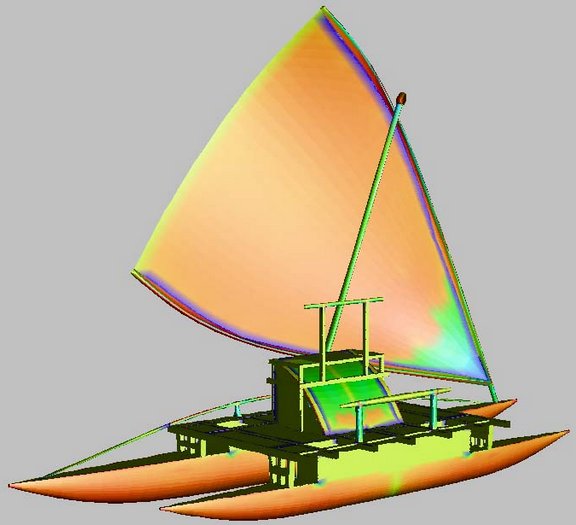
Mokuola
meant the Living Island (Motu
Ora) and the Bay of Hilo (Hiro,
Whiro) must have
alluded to
Mercury:
|
Names for
Mercury: |
|
Hawaiian Islands |
Society Islands |
Tuamotus |
New Zealand |
Pukapuka |
|
Ukali
or Ukali-alii
'Following-the-chief'
(i.e. the Sun)
Kawela 'Radiant' |
Ta'ero
or
Ta'ero-arii
'Royal-inebriate'
(referring to
the eccentric
and undignified
behavior of the
planet as it
zigzags from one
side of the Sun
to the other) |
Fatu-ngarue
'Weave-to-and-fro'
Fatu-nga-rue
'Lord of the
Earthquake' |
Whiro
'Steals-off-and-hides';
also the
universal name
for the 'dark of
the Moon' or the
first day of the
lunar month;
also the deity
of sneak thieves
and rascals. |
Te
Mata-pili-loa-ki-te-la
'Star-very-close-to-the-Sun' |
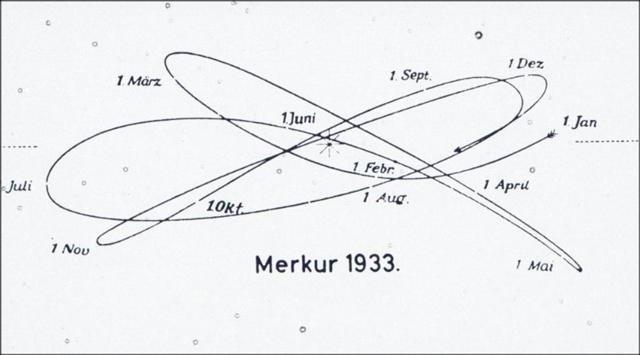
The
rongorongo text lines are
growing upwards in
undulating (serpentine) curves, from
bottom and up to the top end
of the tablets. Also Odin
reached his top position by
growing up in tortuous coils
- cfr the picture at the top of
this page.
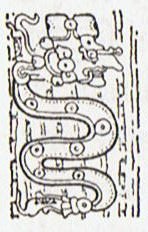
There were
thieves everywhere:
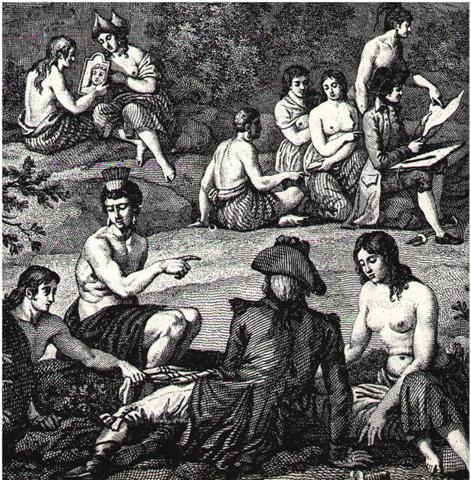
1 + 4 * 7 = 29:
|
1 Hilo
(Hiro) |
... the
first night
of each
month and
the day
following it
was a good
one for
planting.
Water-melons,
gourds,
bananas,
sugar-cane,
taro,
potatoes and
so on, if
planted on
this day,
would bear
well. It was
a day highly
valued for
planting. |
|
27 nights |
|
29 Muku
(Mutu) |
Muku
is the night
on which the
Moon does
not rise.
The name
means
'finished'
and it
refers to
the 'dying'
of the Moon.
It is a day
for planting
crops, a day
of
low tide,
when
the sea
gathers up
and returns
the sand to
its place, a
day of
diving for
sea-urchins,
small and
large, for
gathering
sea-weed,
for
line-fishing
by children,
squid-catching,
uluulu
[uruuru]
fishing,
pulu [puru]
fishing and
so forth.
Such is the
activity of
this day. |
|
Hiro
1. A deity
invoked when
praying for
rain
(meaning
uncertain).
2. To twine
tree fibres
(hauhau,
mahute)
into strings
or ropes.
Ohirohiro,
waterspout
(more
exactly
pú ohirohiro),
a column of
water which
rises
spinning on
itself.
Vanaga.
To spin, to
twist. P
Mgv.:
hiro,
iro, to
make a cord
or line in
the native
manner by
twisting on
the thigh.
Mq.: fió,
hió,
to spin, to
twist, to
twine. Ta.:
hiro,
to twist.
This differs
essentially
from the
in-and-out
movement
involved in
hiri
2, for here
the movement
is that of
rolling on
the axis of
length, the
result is
that of
spinning.
Starting
with the
coir fiber,
the first
operation is
to roll (hiro)
by the palm
of the hand
upon the
thigh, which
lies
coveniently
exposed in
the
crosslegged
sedentary
posture, two
or three
threads into
a cord; next
to plait (hiri)
three or
other odd
number of
such cords
into sennit.
Hirohiro,
to mix, to
blend, to
dissolve, to
infuse, to
inject, to
season, to
streak with
several
colors;
hirohiro ei
paatai,
to salt.
Hirohiroa,
to mingle;
hirohiroa
ei vai,
diluted with
water.
Churchill.
Ta.: Hiro,
to
exaggerate.
Ha.:
hilohilo,
to lengthen
a speech by
mentioning
little
circumstances,
to make nice
oratorial
language.
Churchill.
Whiro
'Steals-off-and-hides';
also [in
addition to
the name of
Mercury] the
universal
name for the
'dark of the
Moon' or the
first day of
the lunar
month; also
the deity of
sneak
thieves and
rascals.
Makemson. |
|
Mutu
1. Cut
short,
shortened,
amputated;
at an end,
ceased;
anything cut
off short;
short,
brief, quick
(rare).
Ua muku
ko'u lole,
my dress is
shortened.
He
kanaka wāwae
muku, a
person with
amputated
foot.
Huli muku
a'ela nā
wa'a,
the canoes
turned
sharply.
(PPN
mutu.)
2. A measure
of length
from
fingertips
of one hand
to the elbow
of the other
arm, when
both arms
are extended
to the side.
3. Broken
section of a
wave or
crest. See
lala
1. 4. Same
as
Mumuku,
a wind. 5.
Thirtieth
night of the
moon, when
it has
entirely
disappeared
(muku).
6. Starboard
ends of
'iako
(outrigger
booms),
hence
starboard
sides of a
canoe.
Wehewehe. |
|








